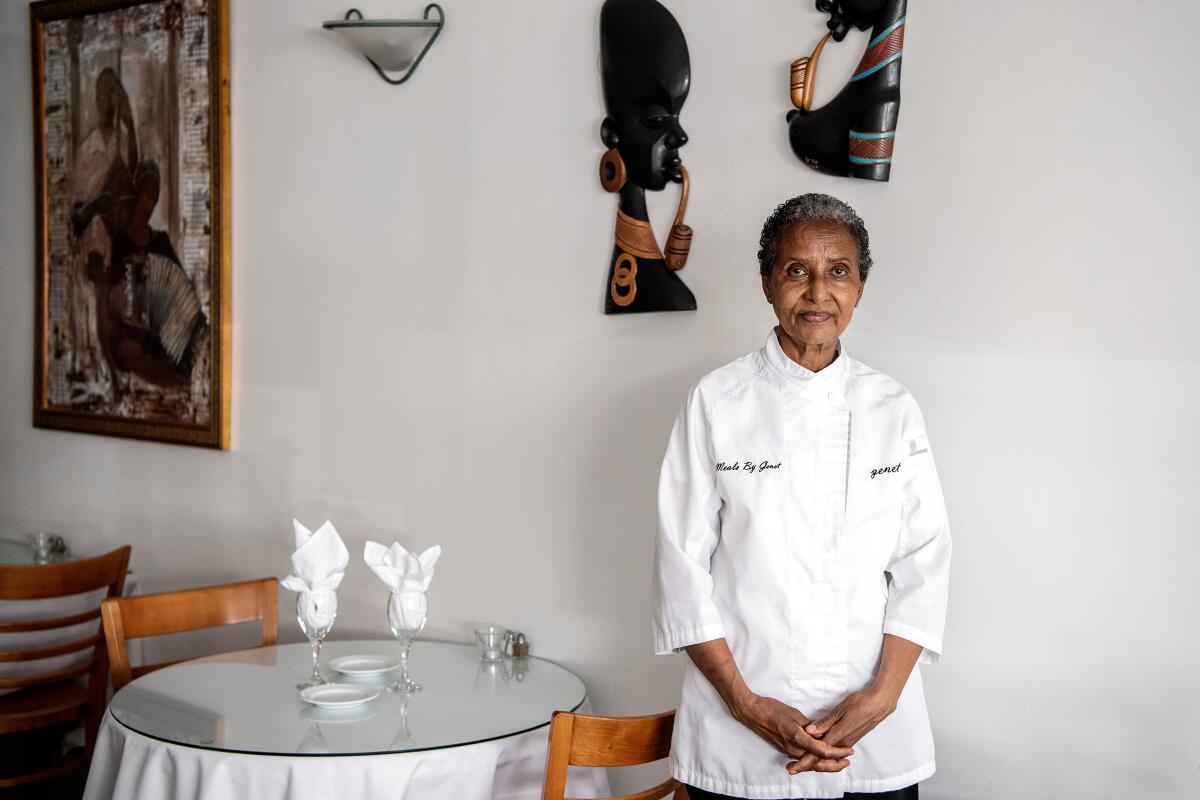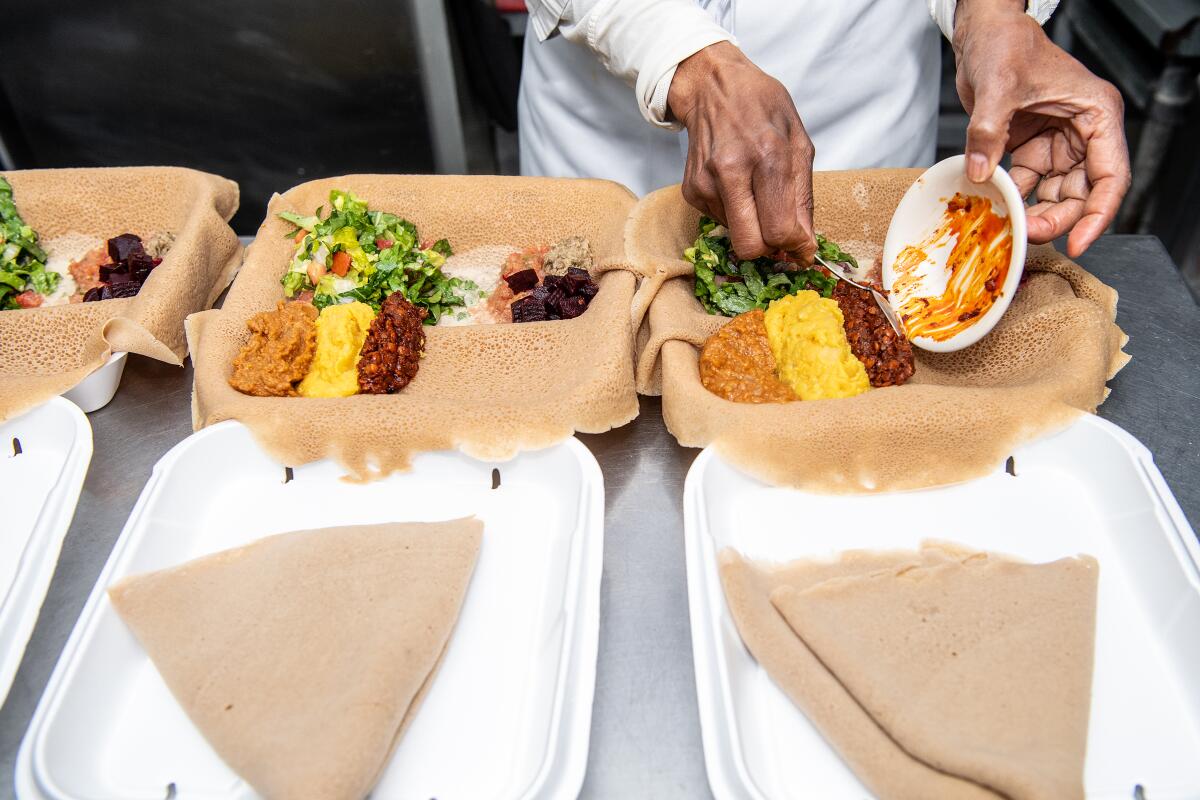L.A.’s most celebrated Ethiopian restaurant reopens this week for a new beginning

- Share via
After 2½ years, L.A.’s most celebrated Ethiopian restaurant is ready to reopen its dining room. And Genet Agonafer, its semi-retired chef and owner, is ready for a return to the flurry of excitement, the hugs from longtime guests and the glow of candlelight along Fairfax Avenue.
When the pandemic temporarily closed Meals by Genet in early 2020, Agonafer took months to weigh her options. She decided, for the sake of her sanity, her health and her family, to never reopen dine-in service, flipping her business model to takeout only and offering the dining room for private events .
In 2021, things ran smoothly. In 2022, and especially in 2023 — a tirelessly difficult year that saw more than 70 notable closures across Los Angeles alone — business lagged, and Agonafer faced a difficult choice: Reopen Meals by Genet for regular service or close it permanently. In the end, she chose her passion, cooking.
A brutal year for Los Angeles restaurants saw dozens of closings across the city. Inflation, actors’ and writers’ strikes and higher rent, utilities and labor costs all were cited.
“I love, love, love my job,” Agonafer said. “I don’t know what I would do. I would fall apart if I stopped cooking and doing this. I actually enjoy every minute of it. I love what I do.”
Now, she’s planning a new business model: reopening for dine-in starting Jan. 5, from Friday to Sunday, allowing for what she hopes will be both an ideal work-life balance for the operator now in her 70s and a return for a legion of fans.

How chef Genet Agonafer helped make Ethiopian cuisine one of the central pieces in the mosaic of Los Angeles culinary culture
“Meals by Genet was always a place to gather friends around a shared feast, trading gossip and laughs and intense debates over politics or movies between bites of Agonafer’s cooking,” writes L.A. Times Food general manager Laurie Ochoa, “served in the always-bustling bistro that for years drew hungry eaters to Los Angeles’ Little Ethiopia.”
Last year, L.A. Times Food critic Bill Addision entered the restaurant into the 101 List Hall of Fame. Last year, the Michelin guide said Agonafer’s dishes “delight” and noted her offerings extend “well past the region’s best-known items.”
“I would be devastated if I never got to taste Genet Agonafer’s doro wot again,” the late L.A. Times restaurant critic Jonathan Gold once wrote, “and I’m not the one laboring in the kitchen for three days on the sauce.”
Customers continued to pick up takeout to celebrate special occasions such as anniversaries or Valentine’s Day. Children, Agonafer said, have been born and then raised on her food. She’s excited and grateful to see them again and notes that though the days and hours will be limited, the menu won’t be.
She’s used the last two years of semi-retirement to rest and to relax. She’s binged “Schitt’s Creek” multiple times — a luxury of time she’d never given herself before. “I have zero regrets taking that time,” she said. “It gave me peace of mind. But I don’t want no peace of mind now; I need to earn, I need to keep my employees happy and myself going.”
Agonafer used to work 18 or 19 hours each day of business, waking early to arrive at her restaurant at 5 or 6 a.m. Pre-pandemic, Meals by Genet saw four prep cooks in the kitchen and three service staff in the dining room every night.
Without a full staff and limiting hours, she’ll be paring down her cooks and servers for service that runs 6 to 9 p.m. on weekends, and possibly reconfiguring the dining room’s tables in an attempt to run the restaurant more efficiently.
Before March 2020, she would serve 100 to 120 customers a night in her intimate dining room. But what she would make on a good day, pre-pandemic, she would make in an entire month in 2022 and 2023. Agonafer reasoned that she would treat the takeout-only Meals by Genet as a new business that just needed time to find its footing.
After her 2021 decision to eliminate dine-in service, the restaurant’s private events and takeout buoyed the operation. But in 2022, as dining out began to return to pre-pandemic levels, she noticed that customers were opting for seated, full-service experiences elsewhere; in that time, she saw both her private events and takeout orders dwindle.
Sometimes there would be no in-person takeout sales from the restaurant at all, and scant orders placed through delivery apps; she sometimes made as little as $100 in a night. For all of 2022 and 2023, the chef said she paid out of pocket to keep the restaurant afloat, running through nearly all her personal savings, contributing $5,000 or more during bad sales months.
“I just started going down and down, and everything I worked for was gonna disappear,” she said. “I was healthy, so I have nothing to complain about, but business-wise, it was ridiculously horrific. Like everyone else, I got hit really, really bad.”

Agonafer saw restaurants shuttering across the city, including near her own place. She began to feel that the option to reopen in the face of permanent closure was a blessing.
One regular suggested limited days and hours of operation, which would allow Agonafer ample time to rest, see her son and grandchildren and prepare for her dine-in service each week. The new schedule should allow travel and family time Monday to Wednesday, with Thursdays reserved for restaurant preparation. Once she reopens, she plans to still offer the space and her cooking for private events .
She recently told another regular that she’d soon be relaunching dine-in service, and the customer let out a scream in response. The support, Agonafer said, has been overwhelming.
“Now, I get to be more grateful, more appreciative of every dime I make,” she said. “Before, it was taken for granted. You’d make this much money and say, ‘Oh, that was slow.’ You will never, ever hear me say that again. Not me. Now I know what slow is.”
Over the last few weeks, quietly, she began preparing: large batches of kulet, doro wat paste — a backbone of Ethiopian cuisine — as well as lentils. She’s been restocking ingredients for her combination of vegetable sides, one of her most popular items, and taking inventory of honey wine, table candles and other items with her small staff, led by years-long employee Olivier Hoarau. The table linens and napkins have been sent to the cleaner and laid out on the tables. The glasses are polished and sitting ready.
One afternoon in late December, a cleaner dropped off a load of freshly washed dish towels and napkins in preparation for the reopening. The moment made Agonafer jittery with anticipation.
“You know, this is it,” she said. “It actually made me [feel] that excitement I got on Day 1 in 2000. It is really happening, it’s really here.”
More to Read
Eat your way across L.A.
Get our weekly Tasting Notes newsletter for reviews, news and more.
You may occasionally receive promotional content from the Los Angeles Times.













